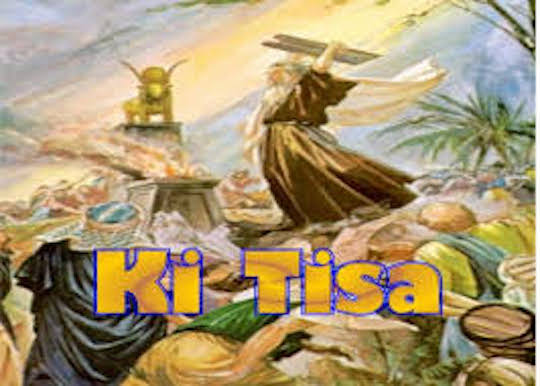This week’s parasha, Ki Tisa, tells the story of the Golden Calf- one of the most difficult to understand episodes in the Torah. As you likely recall, the Jewish nation- or, at least, some part of it- angered God greatly by creating and worshipping a golden calf- and did so soon after receiving the Torah at Sinai! Let’s take a closer look at Moshe Rabbeinu’s reaction upon seeing this terrible event.
Moshe had been in Heaven for just about 40 days, miraculously going without food, drink and sleep as he learned the entire Torah from Hashem. He was given the Luchot, the tablets containing the Aseret Hadibrot (Ten Commandments) that he had conveyed to the people not long ago. He was preparing to bring the tablets to the people when Hashem informed him of their sin with the Golden Calf:
‘Go down, for your nation which you have brought up from Egypt has ruined. They have turned quickly from the way I have commanded them; they have made for themselves a calf as an idol…’
-Ki Tisa, 32:7-8
Hashem then told him that He would wipe out the entire B’nei Israel- except for Moshe, from whom a new nation would begin. Moshe prayed and begged for the people to be spared, and Hashem mercifully accepted Moshe’s pleas; only the small minority who had actually served the eigel as an idol would be killed now, while most of the rest of the nation (who had encouraged the sinners to some extent) would receive their punishment over the course of time.
Moshe headed back, and soon heard and saw the idol worshippers partying around the eigel. Immediately, he threw the Luchot down to the ground at the foot of Har Sinai, where they shattered. This act was a protest against the behavior of the people, as if to say that they did not deserve the Luchot and the closeness with God they represented. Moshe organized the tribe of Levi to avenge Hashem’s honor by killing the idol worshippers, and order was restored. Eventually, Hashem called him to make new Luchot as replacements for the broken ones:
‘Carve for yourself two tablets of stone like the first ones, and I will write on the tablets the words that had been on the first tablets, that you broke…’
-Ki Tisa, 34:1
He was later told to go up the mountain, where Hashem assured him that He had forgiven the people, and wrote for him the commandments. But although everything seemed to return to normal, that was not really the case:
Had we remained with the first Luchot, we would not forget our Torah study. Once they were broken, one who studies Torah can forget it.
-Gemara Eruvin 54a
The first tablets were made by Hashem Himself- and Moshe broke them. The second ones, as we have just seen, were engraved by Moshe, with Hashem finishing the job. According to the commentators, the difference in the material and composition of the Luchot reflected the new reality of forgetting the Torah. Whereas until this point one who studies Torah would have enjoyed Heavenly assistance so that the words would remain in his heart and mind forever, the breaking of the Luchot brought a reality in which one would have to exert tremendous effort in order to understand and remember everything.
According to the great Rabbi Shimon Shkop, Moshe was aware of the eventual consequences of his actions. In fact, he broke them exactly because of the change that it would bring. He was aware that people would be able to study and know Torah- but without necessarily working on their character or improving themselves. The sin of the eigel showed him the danger of ‘easy access’ to Torah knowledge if there was not enough fear of Hashem beforehand; a person could become a Torah scholar and still be a bad person-and this would cause a great chilul Hashem, a desecration of Hashem’s Name.
However, the extra work that would now have to go into Torah study included many ‘rules’. For example, hard work and review would now be needed. Moreover, a person would now have to refine himself in order to merit true Torah knowledge; according to the sixth chapter of Pirkei Avot, for example, fear of Hashem, minimizing in materialistic pursuits and devotion to study are all required in acquiring lasting Torah knowledge.
This all gives more meaning to Hashem’s words in commanding Moshe about the second tablets:
‘Carve for yourself…’
-as in, ‘carve into yourself’. Let the Torah become a part of you- make it apart of you. How? Work on your character and devote yourself to your studies. Only by humbling oneself can he achieve greatness. And only by putting in effort in study and character can one humble himself.
In other words…
Write them (words of Torah) on the tablets of your heart…
-Yirmiyah, 17:1
Have a great Shabbat!
Elli Schwarcz is an alumnus of the Toras Moshe, Ner Israel, and Carteret Yeshivos, and has been involved in Jewish outreach for almost 15 years. He is a Hebrew School and English Language Arts teacher, and has a Master’s Degree in Counseling from Johns Hopkins University. Of all his pursuits, Elli most enjoys teaching high-level Jewish thought and Talmud to teenage boys, exposing them to the beauty and wisdom of their heritage while highlighting their own ability to engage in advanced Torah learning. Elli lives in Lakewood, New Jersey, with his wife and children.
